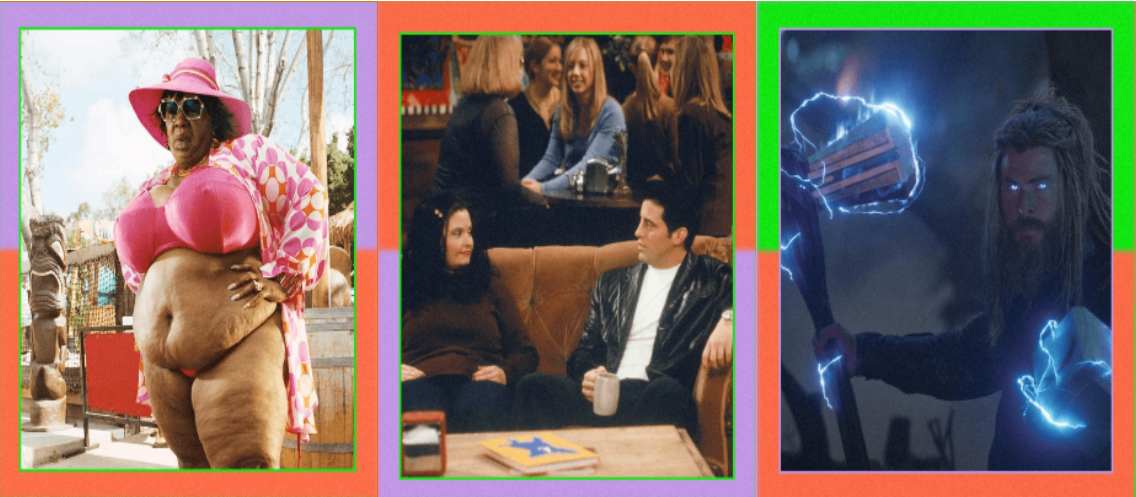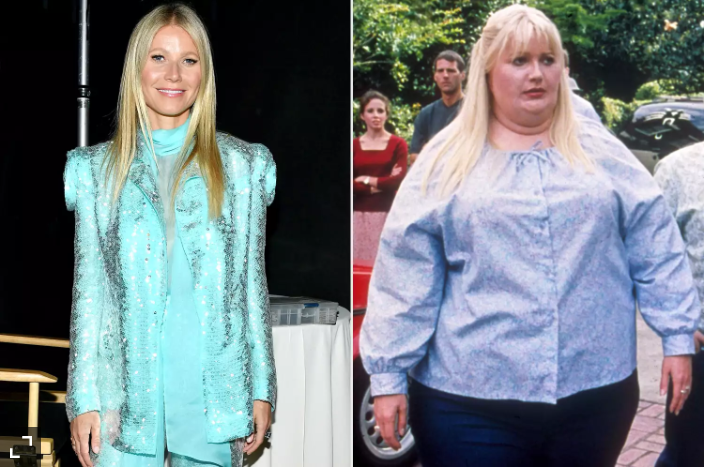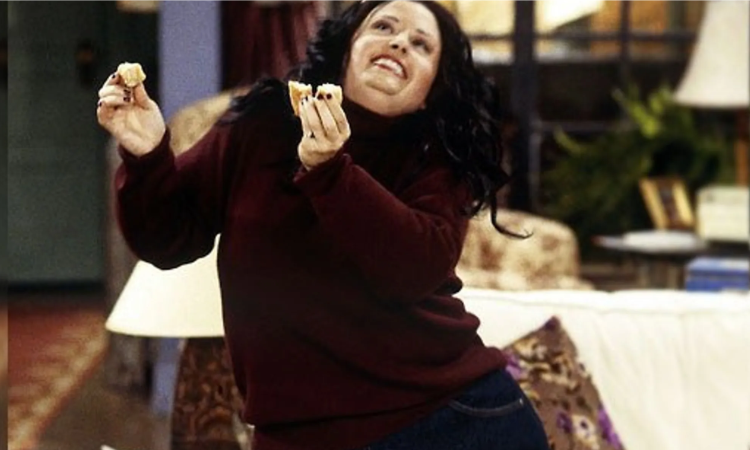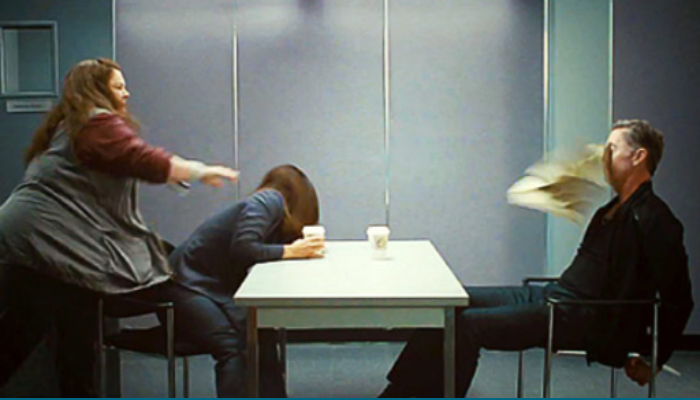Do fat people live in a world that is better than any other time? Yes, we get empowered by seeing self-love and body positive movements everywhere on Instagram or TikTok. But the answer can also be “No” because anti-fatness and fat shaming are still with us like shadows. Wherever we go, they follow us in the form of pure discrimination or unsolicited “for-your-own-good” advice. Worst of all, they are often disguised as fat people jokes told by someone around us or featured in movies and TV series we grow up with.

Without a doubt, in the face of fat shaming or jokes personally, we can express our feelings, defend ourselves, or demand an apology. Unfortunately, when the negativity is conveyed on the screen repeatedly, the trauma can be left undressed for years. And the consequences can be far less funny but sadder than the laughter burst in the cinema.
Fat people jokes are ubiquitous in nearly every sitcom or comedy movie. Shallow Hal, a popular yet nasty comedy, for example, pretends to preach body acceptance but offers cheap laughs the whole time at the expense of an obese character Rosemary, played by Gwyneth in a fat suit. In the movie, Rosemary deserves to be loved only if Jack Black’s character Hal is hypnotized to see every woman as beautiful and hot chic. Or, in another movie Insatiable, the best way to take revenge for the past bully experience is to lose weight and become a beauty pageant queen.

Similar to the twisted value conveyed in those two movies, in The Marvelous Mrs. Maisel, if you are fat, you’re an undesirable person who can never have a sex life or find love but to be ridiculed only. As the main character Mrs. Maisel teases her audience at her wedding, “First of all, my roommate Petra was friendly and fat, which was perfect. I’ll have someone to eat with who won’t steal my boyfriend.” she says.
If those are not insulting enough, let’s take a look at the controversial Fat Monica on Friends. Being exaggerated and stereotyped, she is a formerly fat character designed to make us laugh with jokes that target fat people. Fat Monica Dance, a scene that portrays her dancing with a doughnut in hand, is an intentional fat shame to make fat people the butt of the joke.

Needless to say, the fat shaming scenes in Gilmore Girls, the stereotype that overweight people sit there eating all day in The Nutty Professor, etc., comedies one after another prey on the stereotypes about fat people to make themselves look humorous. But the truth is, fat jokes in media are not funny at all.
Movies and sitcoms agree on presenting fat characters as punchlines and asexualities. They refuse to see fat people as a whole person who has more things to consider in life than just their weight. Instead, they promote that fatness has to be overcome in order to earn respect and love. However, those fat people jokes are never funny because they are based on the vulnerabilities of millions of overweight people, who struggle with eating disorders, low self-esteem issues due to daily anti-fat discrimination, or the frustration of not losing weight despite many attempts.
“Disaster” is what Gwyneth revealed years later after she played Rosemary in Shallow Hal. “The first day I tried the fat suit on, I was in the Tribeca Grand and I walked through the lobby. It was so sad. It was so disturbing. No one would make eye contact with me because I was obese,” she said. “For some reason the clothes they make for women that are overweight are horrible. I felt humiliated because people were really dismissive.”
While the actors can take off their fat suits as soon as film is being made, fat people are those who are trapped in the body to be ridiculed, shamed, and discriminated against. Even as a thinner person, writer EMMA SPECTER wrote in Vogue that Fat Monica brought her complicated feelings as a kid. She got laughs for sure, however, she also “could feel the specter of fat on the horizon”. The fat people jokes in Media left her with a fatphobia at a very young age. “Back then Fat Monica was the thing I knew not to let myself become if I wanted to be pretty or admired or asked out by boys.'' she wrote.
Apart from hurting the fat people or reinforcing the fatphobia, fat people jokes are not funny because they are the same old punchlines. Either by making fun of fat people’s weight or playing with the corny stereotypes of being bullied or being undesirable, jokes about fat people are failing to garner cheap laughs due to repeatedness.
Though fat people jokes are cliches, a lot of people still find them funny. Why? One reason is that they have a deep-rooted bias that being fat is a choice. In addition to the BMI, people have negative images of fat people. They think if overweight people can control their eating habits and become more active, they won’t have problems with “airplane seats” and will be less likely to get chronic diseases associated with being overweight.
Actually, no one necessarily chooses to be fat, especially in a culture where anti-fatness is dominant. The thing is far more complicated than concluding fatness as a sign of lacking control or eating too much. Fat people jokes have never mentioned the anxieties, depressions, and self-destructive behaviors like overeating fat people face. Jokes to fat people and the blame don’t help at all and they never intend to help. Studies have shown that it only makes people sicker and heavier.
Another reason comes from the academic field. The disposition theory of humor, a theory developed by Zillman and Cantor, explains that people tend to enjoy jokes more when the target is a person from a group which they discriminate against. Furthermore, the theory of downward social comparison suggests that we are likely to make ourselves feel better by comparing ourselves to someone of lower status.
Based on the two theories and inspired by the study about sexist-related jokes, Jacob Burmeister and Robert Carels, of Bowling Green State University conducted a study about the influences of anti-fat attitudes on weight-related jokes. It turns out that participants with existing anti-fat attitudes find the clips that make fun of fat people funnier. However, the higher their BMIs are, the less funny they think fat people jokes in media.
Thanks to the rising awareness of body positivity and fat acceptance, things begin to change. We see more and more positive fat characters and fat celebrities in movies, TV series, and music videos. This is Us portrays Kate’s struggle with her weight seriously and sympathetically, including her romantic relationship, sex life, etc.; Avengers: Endgame features fat Thor to prove that you don’t have to wait till you lose your weight to save the world; The Heat overgrows the tragic fat girl type in movies to present us a capable fat detective. As you can see, more and more positive fat characters are created in Media. Those representations matter and writers should do more.

Inevitably, we’ll continue to see fat people jokes in media or life. But the bright side is that things begin to change; fat jokes can’t hurt us because they are the same old punchlines. PlusCupid is also a loving community for you to fight back against anti-fatness. Join us and meet BBW singles to build valuable relationships in our community.